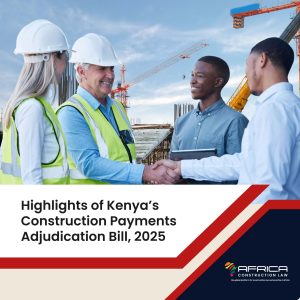ARBITRABILITY OF EMERGING DISPUTES: – TRENDS IN UGANDA’S CONSTRUCTION INDUSTRY
By Olivia Kyarimpa Matovu and Genevieve Atiang Akello of Ligomarc Advocates, Uganda
The Construction Industry in Uganda contributes over 12% of Uganda’s Gross Domestic Product (GDP) with steady growth over the last twenty years. Like most industries, there are common areas of contention in the industry that call for dispute resolution and more recently, disputes like non adherence to Environmental, Social and Governance (ESG) standards have attracted global attention. It is also common knowledge that arbitration is generally the preferred dispute resolution method in most construction contracts because of its numerous industry specific advantages. In this article, we discuss the merits of construction arbitration and emerging trends in construction disputes with a brief analysis of whether these can be amenable to arbitration.
Arbitration as a preferred dispute resolution approach
Arbitration has been lauded for its benefits and suitability to commercial disputes over litigation. This is why an arbitration clause is often included in most construction contracts as best practice. Construction matters often involve scrutiny of large volumes of contracts, the testimonies of expert witnesses and technical processes that are best understood by industry experts. In most cases standardized contracts such as the FIDIC are used to govern construction relationships. As such, the presence of industry experts on a panel of arbitrators is considered to be invaluable.
Arbitration is also preferable to litigation in construction disputes because of time implications that are characteristic of construction law matters. Due to case backlogs in the courts, litigation has attained notoriety for taking considerably long periods of time within which disputes are concluded. In this grim picture, arbitration becomes the preferable choice of dispute resolution presenting additional benefits such as flexible procedures that are adopted according to the wishes of the parties.
The support of the courts in favour of arbitration also makes it preferable to litigation. Numerous cases that have been referred to the courts in a bid to circumvent arbitration have been referred back to arbitration on principle. The courts have also been supportive of arbitration where the other party, often the Respondent, does not cooperate or respect arbitration proceedings. This was the case in Ambitious Construction Company Limited v Uganda National Culture Center (Miscellaneous Application 441 of 2020) [2022] UGCommC 83 (26 September 2022), where court enforced the arbitration clause in a contract for the renovation of the National Theatre premises and went on to appoint an arbitration center which would then appoint a suitable arbitrator. This was after the Respondent had ignored all attempts to commence arbitration proceedings in contempt of their arbitration agreement.
Amenability to arbitration
Arbitration typically arises out of a clause in a contract that provides for reference of disputes between the parties to arbitration. In disputes where there is no initial contract between the parties and therefore no arbitration clause, it poses a challenge as to whether the dispute in question is arbitrable.
Emerging construction disputes’ trends and their amenability to arbitration
Structural damage in construction works
In Uganda, legislation such as the Building Control Act 2013, which establishes the National Building Review Board were enacted to monitor and ensure compliance with the law in construction matters. However, a 2021 survey by the NBRB revealed that 78 percent of buildings do not comply with provisions in the Building Control Act, 2013. There has generally been a surge in building collapses over the past five years with some experts blaming it on various reasons such as weak foundations, substandard construction materials, and poor mixing of material among others.
Whereas contractual liability is easily amenable to arbitration due to the existence of an arbitration clause in a construction contract between the employer and contractor, tortious and negligence claims due to personal injuries or damage to property are not arbitrable. This is because the claimants often do not have any contractual relations with the contractor or the developer from which an arbitration clause would arise.
Most claimants take to litigation under common law or national statutes. For instance, Section 45 of the Building Control Act, 2013 Act places liability on any person whose negligence, commission or omission causes or leads to the occurrence of an accident on a building construction site, which results in the injury or death of another person, or the destruction of property.
Variations of contracts
Construction contracts are often complex with various provisions governing anticipated activities throughout the performance of the contract. Often the circumstances surrounding the performance of construction contracts may necessitate alterations with regard to the changes in the contract price, completion date or scope of work thereunder. This often sparks disputes with regard to the time and financial implications of the said variations, interpretation of the variation contracts and their validity. Since variations of contracts are often envisaged in the construction contract, such disputes are easily amenable to arbitration where there is an arbitration clause.
Land and Environmental, Social, and Governance (ESG) concerns
Globally, ESG compliance standards are being used to asses businesses including the construction industry on the social and environmental impact of their operations. Factors such as the usage of building materials, how raw materials are harvested, the level of greenhouse emissions, and overall environmental impact are considered.
In Uganda, the National Environmental Management Act (NEMA) requires that an Environmental Impact Assessment be obtained by every developer to protect the environment from uncontrolled exploitation and ultimate distraction. Where environmental damage is anticipated, most construction projects are either totally disrupted or considerably delayed.
The recent decision of the European Union (EU) to censure the East African Crude Oil Pipeline project (EACOP) is one of many impending environmental disputes related to the pipeline construction works. The 1,445-kilometer heated pipeline project is expected to transport crude oil from the Albertine Graben in Uganda to the coastal port of Tanga in Tanzania for onward shipment to the international market. The EU’s major concern is that the pipeline is a threat to climate and biodiversity located along its current route. It is also concerned that the pipeline is responsible for eviction of hundreds from their land without fair and adequate compensation.
Environmental disputes are not typically arbitrable and are often only challenged before the courts. For instance, environmental disputes involving the obligations of a state under international treaties have for long been only challenged before international courts like the International Court of Justice (ICJ), the European Court of Justice (ECJ) among others.
However, there have been more recent efforts to incorporate arbitration into international environmental dispute resolution procedures. It has also been observed that environmental disputes may be amenable to arbitration where it is specifically provided for in commercial contracts between the parties, in investment treaties or Multilateral Environmental Agreements (MEA).
Parties may therefore refer disputes to arbitration under commercial contracts like the Paris Agreement on Climate Change, 2015 or through international agreements such as the Convention on International Trade in Endangered Species of Wild Fauna and Flora, 1973 (CITES), the Vienna Convention on the protection of Ozone Layer, 1985 and the Convention on Biodiversity among others.
With the growing preference for arbitration of most commercial disputes, it is easy to predict that the scope of arbitration will soon be extended to cover even disputes previously considered to be unarbitrable. This will ultimately involve policy changes in the national and international front.


















